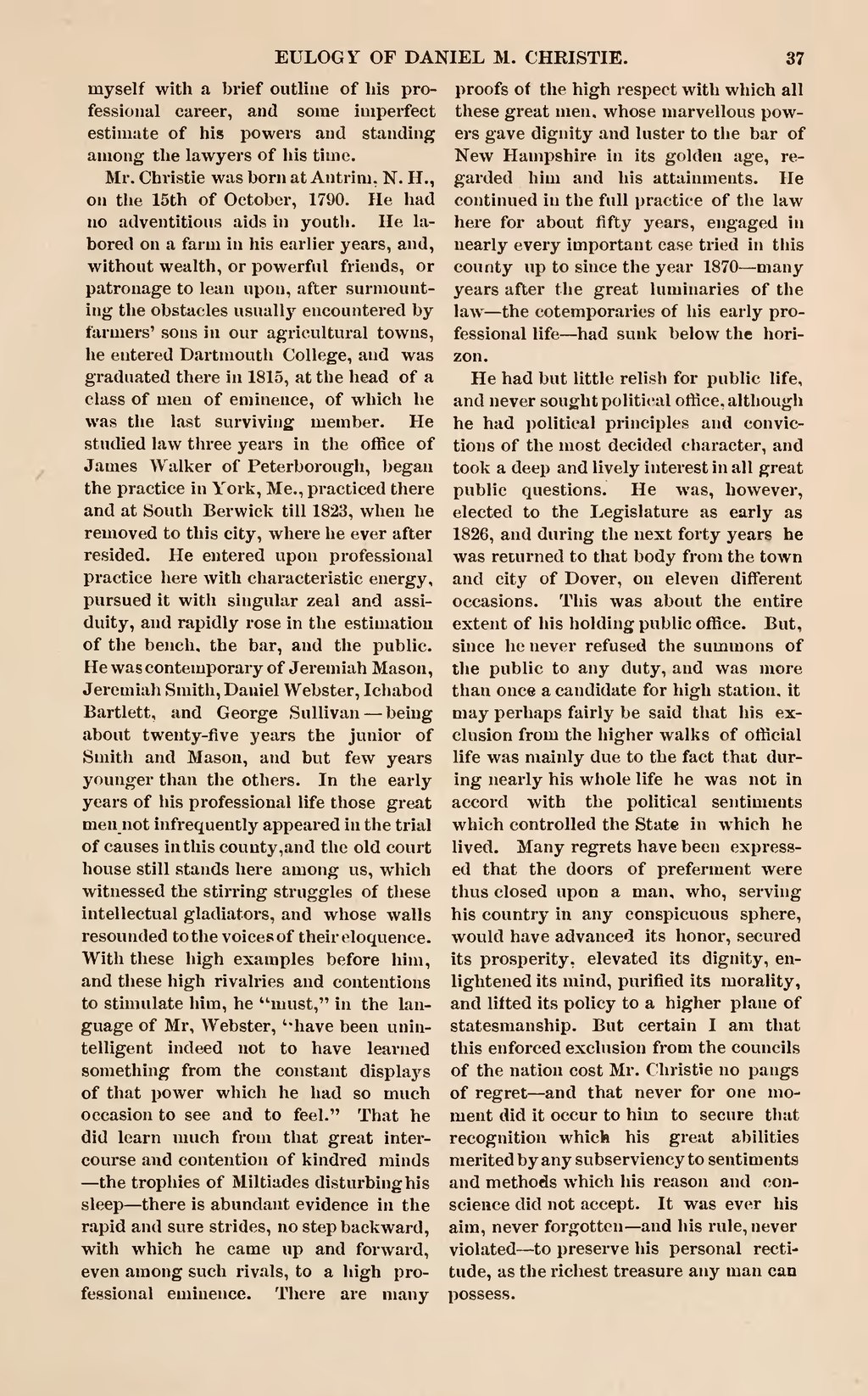myself with a brief outline of his professional career, and some imperfect estimate of his powers and standing among the lawyers of his time.
Mr. Christie was born at Antrim, N. H., on the 15th of October, 1790. He had no adventitious aids in youth. He labored on a farm in his earlier years, and, without wealth, or powerful friends, or patronage to lean upon, after surmounting the obstacles usually encountered by farmers' sons in our agricultural towns, he entered Dartmouth College, and was graduated there in 1815, at the head of a class of men of eminence, of which he was the last surviving member. He studied law three years in the office of James Walker of Peterborough, began the practice in York, Me., practiced there and at South Berwick till 1823, when he removed to this city, where he ever after resided. He entered upon professional practice here with characteristic energy, pursued it with singular zeal and assiduity, and rapidly rose in the estimation of the bench, the bar, and the public. He was contemporary of Jeremiah Mason, Jeremiah Smith, Dauiel Webster, Ichabod Bartlett, and George Sullivan — being about twenty-five years the junior of Smith and Mason, and but few years younger than the others. In the early years of his professional life those great men not infrequently appeared in the trial of causes in this county, and the old court house still stands here among us, which witnessed the stirring struggles of these intellectual gladiators, and whose walls resounded to the voices of their eloquence. With these high examples before him, and these high rivalries and contentions to stimulate him, he "must," in the language of Mr, Webster, "have been unintelligent indeed not to have learned something from the constant displays of that power which he had so much occasion to see and to feel." That he did learn much from that great intercourse and contention of kindred minds — the trophies of Miltiades disturbing his sleep — there is abundant evidence in the rapid and sure strides, no step backward, with which he came up and forward, even among such rivals, to a high professional eminence. There are many proofs of the high respect with which all these great men, whose marvellous powers gave dignity and luster to the bar of New Hampshire in its golden age, regarded him and his attainments. He continued in the full practice of the law here for about fifty years, engaged in nearly every important case tried in this county up to since the year 1870 — many years after the great luminaries of the law — the cotemporaries of his early professional life — had sunk below the horizon.
He had but little relish for public life, and never sought political office, although he had political principles and convictions of the most decided character, and took a deep and lively interest in all great public questions. He was, however, elected to the Legislature as early as 1826, and during the next forty years he was returned to that body from the town and city of Dover, on eleven different occasions. This was about the entire extent of his holding public office. But, since he never refused the summons of the public to any duty, and was more than once a candidate for high station, it may perhaps fairly be said that his exclusion from the higher walks of official life was mainly due to the fact that during nearly his whole life he was not in accord with the political sentiments which controlled the State in which he lived. Many regrets have been expressed that the doors of preferment were thus closed upon a man, who, serving his country in any conspicuous sphere, would have advanced its honor, secured its prosperity, elevated its dignity, enlightened its mind, purified its morality, and lifted its policy to a higher plane of statesmanship. But certain I am that this enforced exclusion from the councils of the nation cost Mr. Christie no pangs of regret — and that never for one moment did it occur to him to secure that recognition which his great abilities merited by any subserviency to sentiments and methods which his reason and conscience did not accept. It was ever his aim, never forgotten— and his rule, never violated — to preserve his personal rectitude, as the richest treasure any man can possess.
